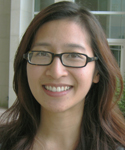Nov 28 2013
Rice University bioengineering graduate student Tiffany Vo has been selected for a Ruth L. Kirschstein National Research Service Award (NRSA) to develop and test an injectable-hydrogel scaffold for craniofacial bone tissue regeneration.
 Tiffany Vo
Tiffany Vo
Vo is a fourth-year doctoral graduate student of Antonios Mikos, Rice’s Louis Calder Professor of Bioengineering and Chemical and Biomolecular Engineering. The hydrogel scaffold Vo is engineering is a dual-purpose substrate that is a soluble liquid at room temperature and can be injected noninvasively. Then at body temperature, the biomaterial instantaneously gels and conforms to irregular three-dimensional spaces and provides a platform for functional and aesthetic tissue regeneration.
Thermosensitive technologies are not new to the field of tissue engineering and regenerative medicine. But what makes Vo’s poly(N-isopropylacrylamide) or PNiPAAm scaffold promising is that its chemical cross-linking technology allows her to eliminate gel shrinkage without reducing swelling, and thus improve its stability so that it serves as an effective delivery vehicle for growth factors and stem-cell populations.
Once sufficient quality and quantity of bone tissue has regenerated to fill the defected site, the hydrogel scaffold can be transitioned back into a liquid state and released naturally.
As part of the project Vo will also test the hydrogel’s enhanced seeding capabilities and abilities to promote cellular attachment, crosstalk and proliferation toward greater bone formation. The knowledge will improve the understanding of biomaterials-based therapies for minimally invasive tissue regeneration as viable clinical alternatives.
Ruth L. Kirschstein NRSA grants honor the late doctor for her service to the National Institutes of Health and her pioneering research toward the development of improved, safer polio vaccines. The program provides funding for qualified students in biomedical and behavioral sciences to help increase the number of well-trained scientists from underrepresented groups.